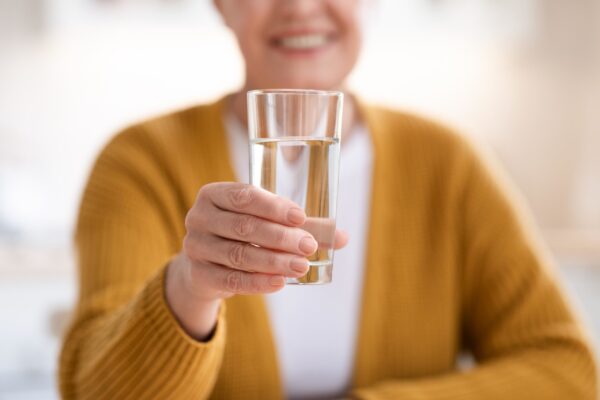Dehydration in Older Adults: Causes, Symptoms, and Prevention Tips

Why it’s important to stay hydrated, especially as you age
No matter what age, our bodies depend on water to survive. From our individual cells to our organs, every component of our body requires water to function properly. As we age, hydration becomes especially important because our bodies can lose about 2.5 to 3 liters of water daily through normal activity. As a natural part of the aging process, our bodies undergo physiological changes that increase the risk of dehydration in older adults.
17-28% of older adults in the US experience dehydration which oftentimes leads to hospitalization. Drinking plenty of fluids is critical to daily wellness because our bodies use water to remove waste, maintain body temperature and blood volume, encourage proper circulation, promote healthy kidney function, lubricate joints, and much more.
Causes and symptoms of dehydration in older adults
Preventing dehydration in older adults begins with understanding the causes and symptoms. Causes of dehydration might include:
Normal aging
Chronic illnesses
Medication side effects
Incontinence
Fears associated with falling when using the restroom
Weakened sense of thirst
And more
Some symptoms that indicate you’re dealing with a state of dehydration might include:
Dry mouth and skin
Less frequent urination
Cracked lips
Dizziness and fatigue
Irritability and confusion
Muscle cramps and even fainting
Prevention of dehydration
The key to preventing dehydration in older adults is to stay on top of fluid intake throughout the day. Aging individuals should aim to drink about a third to a half of their body weight in ounces daily. Water intake may vary depending on medical conditions and medications.
If you are unsure how much water you should be consuming daily, it is best to consult with your doctor. A key tip to managing your fluid intake is to keep track of your water consumption in a journal, as well as note any symptoms you might experience throughout the day.
If drinking water is difficult for you, find alternatives that work for you, but avoid beverages with high sugar content and try to mix in water throughout the day. Beverage alternatives might include:
Flavored water
Milk
Juice
Smoothies
And more
We’re focused on your well-being at Knute Nelson.
At Knute Nelson, we know that dehydration often gives early warning signs before it can cause harm. That’s why our caregivers are always watching for telltale dehydration symptoms, so they’re prepared to act quickly and help an individual get the rest and hydration they need.
Helping our residents, patients, and clients live and age well is our primary mission. Contact us today or call (320) 421-0242 to learn more about us and the different healthcare solutions available for older adults at Knute Nelson.
3 Hydration Tips for Seniors
1. Drinking water isn’t the only way to get fluids.
While drinking water is typically the most common fluid to help you stay hydrated, it’s important to keep in mind that beverages aren’t your only source of fluids.
Raw fruits and vegetables can pack a hydrating punch while providing key nutrients. A small plate of cut vegetables, like cucumbers, cherry tomatoes, celery, or bell peppers served with hummus for dipping can be a fluid-filled treat.
2. Remember to avoid too much caffeine.
It’s a common misconception that drinks like coffee and tea provide proper hydration. While it’s true that these options contain ample water, the reality is that drinks like coffee and tea have caffeine in them, which are known as diuretics.
These types of beverages can lead to increased fluid loss, which results in dehydration, so avoiding too much caffeine is important to maintaining a proper level of daily hydration.
3. Always keep a water bottle close.
To stay hydrated, you must make drinking water multiple times a day a habit. Make it easy on yourself and always keep a large, filled water bottle close by. This one bottle can serve as a constant reminder to take a sip and it can minimize the number of times you have to get up and refill a drinking glass.
You can also make it a habit to drink before any activity. For example, when you sit down for a meal, drink some water. When you wake up in the morning, drink some water. The more you make this a top priority, the more it will become an instinctive action.
Last updated January 15th, 2024

